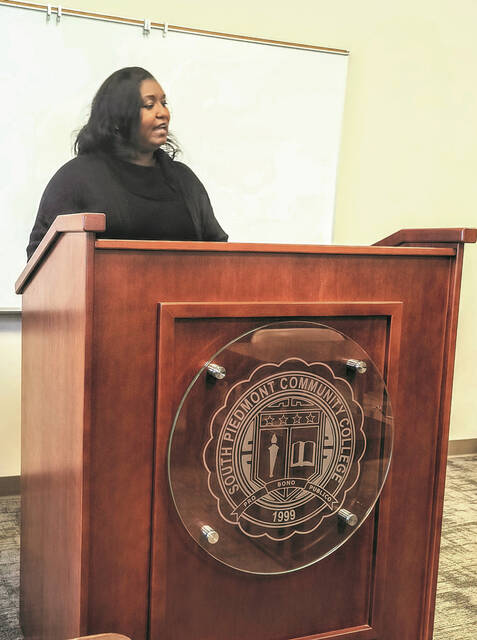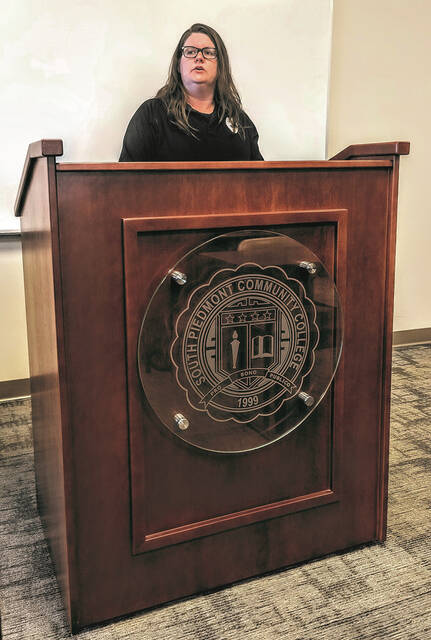
Sargent Chance-Horne explains that even though getting pepper sprayed was optional in her department, “I got tased because I did not want anybody to take it easy on me or give me special treatment because I’m a girl.”
POLKTON — In honor of Women’s History month, South Piedmont Community College’s annual advisory board for Women’s History month selected the theme ‘Women In Law and Safety.’
The Lunch and Learn event, held in the Horne Library at SPCC Polkton campus on March 19, featured three women representing diverse areas of law enforcement and rescue services: D’Anya Chance-Horne, Takesha Hammond, and Jessica Paul.
Deborah Barrett, who is the Director of Public Safety Curriculum Programs for SPCC, suggested women in safety and law enforcement as this year’s theme. Barrett has over twenty years as a public safety officer under her belt and remembers some of the difficulties she experienced as a woman starting out her career in a male dominated profession.
“These women represent over fifty years working in law enforcement in Anson county when combined together,” says Barrett proudly.
Though law enforcement is often thought of as male driven, Barrett feels, “Women have a lot to bring to the table, like strong communication skills, problem solving capabilities, and a knack for empathizing,” outlines Barrett. “In law enforcement the male and female perception are both needed,” she adds.
Speaking before a crowded room, Sargent Chance-Horne shares, “I have been with the Wadesboro Police Department for seven years. I started when I was twenty-three, had just had a son, and was at a point in life where I wanted to start a purposeful career.”
When she made the decision to go into law enforcement, Chance-Horne says, “If I was going to do this, put my life on the line, I want to do it in a community where my family is, where my brothers are, and where I know I can truly make a difference.”
A graduate of Anson High School, Chance-Horne was living in Charlotte when she made the decision to return home and start protecting her hometown of Wadesboro.
“Now I am our sex crimes involving children investigator, juvenile cases, evidence and property management custodian,” says Chance-Horne, who is also charged with investigating the background of potential new recruits.
“The best part of the job is being out in the streets dealing with people. It is my favorite part of the job,” she shares.
In order to serve as a law enforcement officer, you need to be a United States citizen, pass extensive background checks, have a high school diploma or GED. Among other requirements, potential candidates must complete Basic Law Enforcement Training and pass the BLET state exam.
Realizing that law enforcement may not be for all women, Chance-Horne offers this advice, “Never be afraid to be you. If you have a passion, work hard for it.”
Takesha Hammond, Anson’s Correctional Program Director, has worked for the Department of Corrections for 21 years and is still amazed by her career. Though Hammond started out in Albemarle, when Lanesboro Prison was built in Anson, she quickly transferred.
Initially a case manager, Hammond saw the prison balloon from nine hundred male offenders to 1,504. When the prison changed its name to Anson Correctional and began housing female offenders rather than males, Hammond shares, “We went from fighting to crying.”
According to statistics shared by Hammond, there is a fifty to fifty hiring ratio of women to men staff in law enforcement and 57.1% of new hires in the profession are women.
Hammond explains that there are a lot of career opportunities for women in law enforcement, outlining, “Administrative, medical, mental health, janitorial, alcohol dependency or behavioral specialist.”
Assistant Chief of the Gulledge Fire Department and Probation Parole (PPO) officer, Jessica Paul, knew from an early age what she wanted to be when she grew up. Close with her grandfather, the legendary George Yough formerly of the Wadesboro Fire Department, he instilled in Paul a desire to help and protect others.
At just seventeen, Paul was voted into the Gulledge Fire Department. Beginning her fire certification classes at the Lockhart-Taylor Center, she was the only female in her class.
Paul got into probation due to her belief that people deserve a second chance. “It [probation] allows us as probation officers to work with people, communicate with them, and just find out what is going on with them.”
Probation officers work with people who have been convicted of a crime but not incarcerated. To become a probation officer, one must have a Bachelor’s degree and complete probation training.
“You will have calls that stay with you forever, good and bad,” says Paul. When it comes to excelling in a traditionally male dominated profession, Paul advises, “Push forward, work hard, and prove them wrong.”
Aiding to bring all genders into law enforcement, Barrett announced that SPCC will offer a two-year Forensics course for high school and early college students starting this fall.
“We already offer a Criminal Justice course so we are very excited to announce this Forensics course,” promoted Barrett.
All three speakers excitedly announced law enforcement is hiring across all departments.
Reach Lauren Monica at (843) 910-1020 or lmonica@ansonrecord.com





